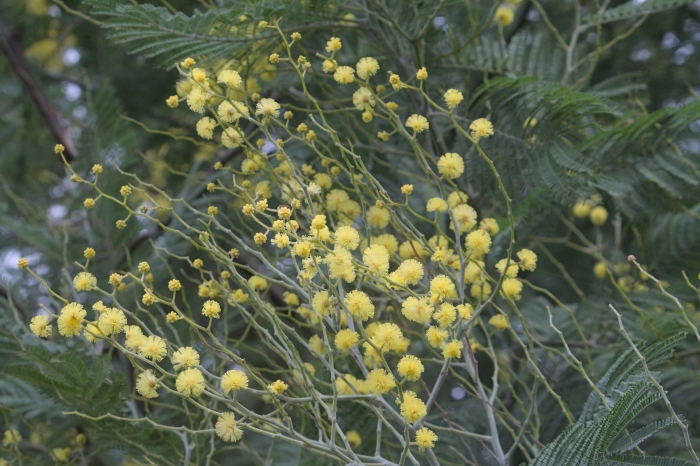Black Wattle
(Acacia decurrens)
Black Wattle (Acacia decurrens)
/
/

o_andras
CC BY 4.0
Image By:
o_andras
Recorded By:
Copyright:
CC BY 4.0
Copyright Notice:
Photo by: o_andras | License Type: CC BY 4.0 | License URL: http://creativecommons.org/licenses/by/4.0/ | Rights Holder: o_andras | Publisher: iNaturalist | Date Created: 2024-01-28T10:59:17-08:00 |







Estimated Native Range
Summary
Acacia decurrens, commonly known as Black Wattle or Early Green Wattle, is a fast-growing evergreen tree native to coastal and tableland areas of eastern New South Wales, Australia. It thrives in open woodlands and forest edges, particularly in areas with moist, well-drained soils. This species typically reaches a height of 7-49 feet (2-15 meters) and has a spreading habit. The bark is smooth on younger trees but becomes deeply fissured with age. The foliage consists of feathery, fern-like leaves that are a distinctive feature of many acacias. Its bright yellow or golden-yellow flowers are spherical in shape and highly showy, appearing in dense clusters from July to September, followed by seed pods that ripen from November to January.
Black Wattle is valued for its rapid growth and ornamental flowers, which can add a splash of color to the landscape. It is used for various purposes, including erosion control, as a windbreak, and for its nitrogen-fixing properties that can improve soil fertility. In cultivation, it prefers full sun to partial shade and requires well-drained soils. While it is drought-tolerant once established, regular watering will encourage more vigorous growth. Black Wattle can be susceptible to root rot if overwatered or planted in poorly drained soils. It is also known to be potentially invasive outside its native range due to its prolific seeding and should be planted with caution.CC BY-SA 4.0
Black Wattle is valued for its rapid growth and ornamental flowers, which can add a splash of color to the landscape. It is used for various purposes, including erosion control, as a windbreak, and for its nitrogen-fixing properties that can improve soil fertility. In cultivation, it prefers full sun to partial shade and requires well-drained soils. While it is drought-tolerant once established, regular watering will encourage more vigorous growth. Black Wattle can be susceptible to root rot if overwatered or planted in poorly drained soils. It is also known to be potentially invasive outside its native range due to its prolific seeding and should be planted with caution.CC BY-SA 4.0
Plant Description
- Plant Type: Tree
- Height: 20-30 feet
- Width: 15-20 feet
- Growth Rate: Rapid
- Flower Color: Yellow
- Flowering Season: Winter, Spring
- Leaf Retention: Evergreen
Growth Requirements
- Sun: Full Sun
- Water: Medium, High
- Drainage: Medium, Fast
Common Uses
Bee Garden, Drought Tolerant, Erosion Control, Hedges, Low Maintenance, Showy Flowers, Street Planting
Natural Habitat
Coastal and tableland areas of eastern New South Wales, Australia
Other Names
Common Names: Early Green Wattle, Sydney Green Wattle, Sydney Wattle, Black Wattle, Early Black Wattle, Queen Wattle, Xian Ye Jin He Huan
Scientific Names: , Acacia decurrens, Acacia adenophora, Acacia angulata, Acacia decurrens f. decurrens, Acacia decurrens f. normalis, Acacia decurrens var. angulata, Acacia decurrens var. decurrens, Acacia decurrens var. normalis, Acacia decurrens var. normalis
GBIF Accepted Name: